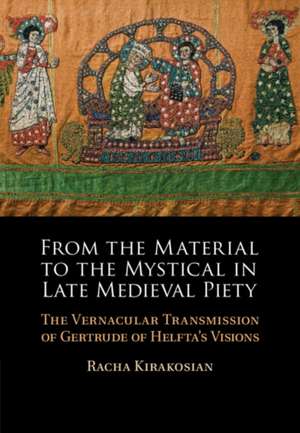From the Material to the Mystical in Late Medieval Piety: The Vernacular Transmission of Gertrude of Helfta's Visions
Autor Racha Kirakosianen Limba Engleză Hardback – 29 sep 2021
Preț: 534.08 lei
Preț vechi: 580.52 lei
-8% Nou
Puncte Express: 801
Preț estimativ în valută:
102.20€ • 111.36$ • 86.12£
102.20€ • 111.36$ • 86.12£
Carte disponibilă
Livrare economică 02-16 aprilie
Livrare express 18-22 martie pentru 48.53 lei
Preluare comenzi: 021 569.72.76
Specificații
ISBN-13: 9781108841238
ISBN-10: 1108841236
Pagini: 350
Dimensiuni: 182 x 258 x 25 mm
Greutate: 0.95 kg
Editura: Cambridge University Press
Colecția Cambridge University Press
Locul publicării:New York, United States
ISBN-10: 1108841236
Pagini: 350
Dimensiuni: 182 x 258 x 25 mm
Greutate: 0.95 kg
Editura: Cambridge University Press
Colecția Cambridge University Press
Locul publicării:New York, United States
Cuprins
1. The Helfta scriptorium; 2. Redactions within a dynamic textuality; 3. Manuscript transmission history; 4. The book's self-reflectivity; 5. The scriptorial heart; 6. Imaginary textiles; Final remarks; Bibliography; Appendix; Index.
Recenzii
'In exploring the Latin and vernacular production and reception of Gertrud von Helfta's Legatus divinae pietatis, Racha Kirakosian is redefining late medieval authorship and the value of each redaction within the landscape of late medieval piety. Her book offers innovative and always exciting discoveries as she unpacks the vital transmission of Gertrud's Legatus combining the scribal nature of late medieval piety with the textile culture of religious communities. Groundbreaking research, brilliantly written, a scholarly masterpiece!' Hans-Jocher Schiewer, University of Freiburg
'Like the textiles Gertrude's writings and their translations so beautifully evoke, Racha Kirakosian's book weaves together philological investigations, interpretive analyses, and unwavering attention to human communities to create a colorful, richly textured view of later medieval monastic life. Though rigorously centered on texts - their complex process of creation, reception, and transmission - this book has much to offer historians of art and material culture, female monasticism and reform, and the medieval religious imagination more broadly.' Jacqueline E. Jung, Professor of History of Art, Yale University
'This book draws on newly discovered evidence for the collaborative production of the Latin visions of Gertrude of Helfta (d. 1301) and proposes a new approach to reading the late fourteenth-century German translation, der botte der götlichen miltekeit. A complete analysis of the manuscripts of the botte, understood as examples of dynamic textuality, is combined with studies of text production, redaction, reading and copying, and an innovative discussion of the interplay between material culture and the presentation of textiles in the two versions of Gertrude's visions.' Nigel F. Palmer, Emeritus Professor of German Medieval and Linguistic Studies, St Edmund Hall, University of Oxford
'Like the textiles Gertrude's writings and their translations so beautifully evoke, Racha Kirakosian's book weaves together philological investigations, interpretive analyses, and unwavering attention to human communities to create a colorful, richly textured view of later medieval monastic life. Though rigorously centered on texts - their complex process of creation, reception, and transmission - this book has much to offer historians of art and material culture, female monasticism and reform, and the medieval religious imagination more broadly.' Jacqueline E. Jung, Professor of History of Art, Yale University
'This book draws on newly discovered evidence for the collaborative production of the Latin visions of Gertrude of Helfta (d. 1301) and proposes a new approach to reading the late fourteenth-century German translation, der botte der götlichen miltekeit. A complete analysis of the manuscripts of the botte, understood as examples of dynamic textuality, is combined with studies of text production, redaction, reading and copying, and an innovative discussion of the interplay between material culture and the presentation of textiles in the two versions of Gertrude's visions.' Nigel F. Palmer, Emeritus Professor of German Medieval and Linguistic Studies, St Edmund Hall, University of Oxford
Notă biografică
Descriere
Examining correlations between the material and the mystical, this books investigates collective writing and devotional culture in late medieval piety.
